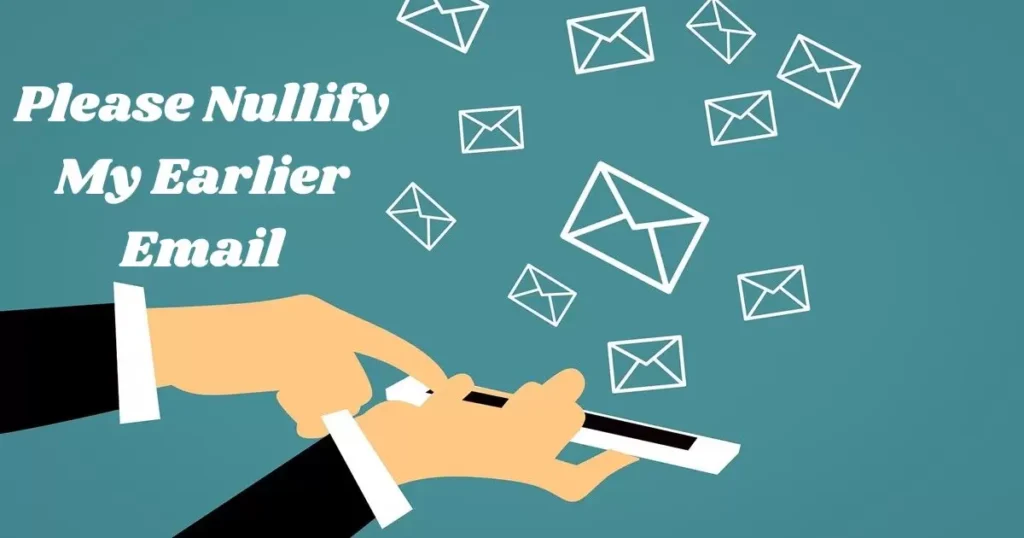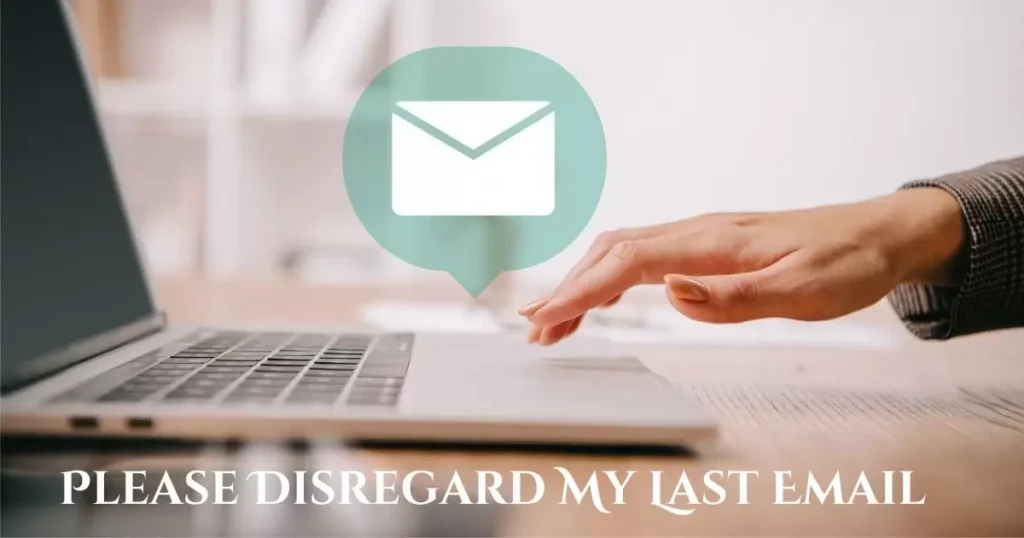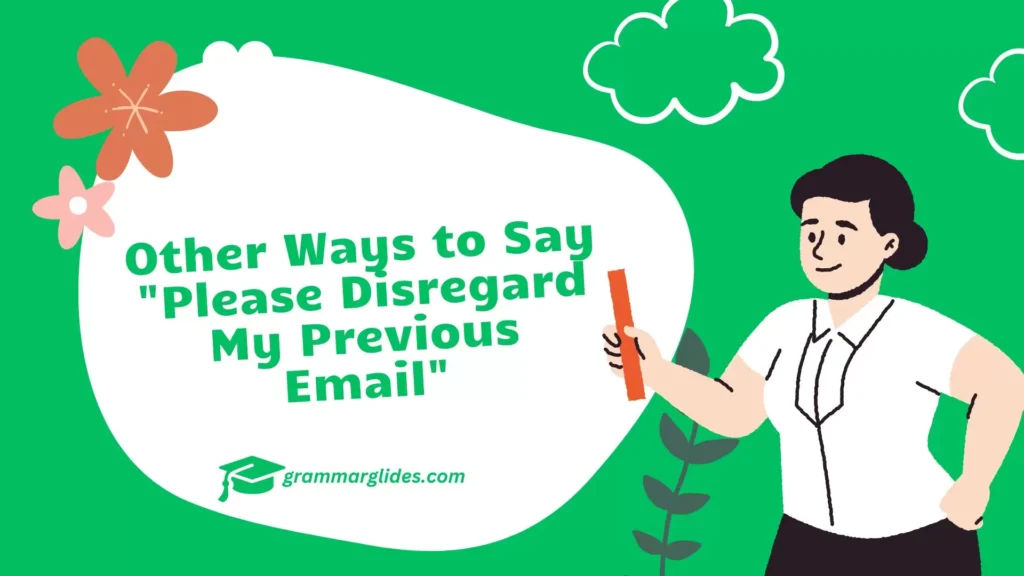In professional communication, it’s important to efficiently address mistakes or updates by asking recipients to ignore earlier messages. Instead of saying “Please disregard my previous email,” you can use several alternative phrases.
Here’s a guide to 30 different ways to convey this message, along with examples and explanations.
1. “Please Ignore My Previous Message”
Scenario: Requesting that the recipient overlooks the earlier message.
- Example 1: “Please ignore my previous message regarding the meeting time.”
- Example 2: “Please ignore my previous message; it contained incorrect information.”
Explanation: “Please ignore my previous message” directly asks the recipient to overlook the prior communication.
2. “Kindly Omit My Earlier Email”
Scenario: Politely asking the recipient to disregard the earlier email.
- Example 1: “Kindly omit my earlier email about the project update.”
- Example 2: “Kindly omit my earlier email as it was sent in error.”
Explanation: “Kindly omit my earlier email” is a polite way to request that the previous email be disregarded.
3. “Disregard the Previous Communication”
Scenario: Asking the recipient to ignore the earlier communication.
- Example 1: “Disregard the previous communication regarding the report deadline.”
- Example 2: “Disregard the previous communication as it was sent prematurely.”
Explanation: “Disregard the previous communication” is a clear and direct way to indicate that the prior message should be ignored.
4. “Please Nullify My Earlier Email”

Scenario: Formally requesting that the earlier email be ignored.
- Example 1: “Please nullify my earlier email regarding the policy changes.”
- Example 2: “Please nullify my earlier email as it contained outdated information.”
Explanation: “Please nullify my earlier email” is a formal way to request that the previous email be disregarded.
5. “Ignore the Previous Email”
Scenario: Directly asking the recipient to overlook the earlier email.
- Example 1: “Ignore the previous email about the new procedure.”
- Example 2: “Ignore the previous email; it was not relevant.”
Explanation: “Ignore the previous email” is a straightforward request to disregard the earlier message.
6. “Please Set Aside My Earlier Message”
Scenario: Politely suggesting that the recipient disregard the earlier message.
- Example 1: “Please set aside my earlier message about the event details.”
- Example 2: “Please set aside my earlier message as it was incorrect.”
Explanation: “Please set aside my earlier message” is a polite way to ask the recipient to ignore the previous communication.
7. “Please Disregard the Earlier Note”
Scenario: Requesting that the recipient ignore the previous note.
- Example 1: “Please disregard the earlier note about the product launch.”
- Example 2: “Please disregard the earlier note; it was sent in error.”
Explanation: “Please disregard the earlier note” directs the recipient to ignore the earlier communication.
8. “Forget My Previous Email”
Scenario: Informally asking the recipient to disregard the earlier email.
- Example 1: “Forget my previous email regarding the team meeting.”
- Example 2: “Forget my previous email; it was sent prematurely.”
Explanation: “Forget my previous email” is a casual way to request that the earlier message be ignored.
Other ways to say “See you tomorrow”
9. “Please Ignore the Previous Message”
Scenario: Requesting that the recipient overlook the earlier message.
- Example 1: “Please ignore the previous message about the training session.”
- Example 2: “Please ignore the previous message; it was not intended for you.”
Explanation: “Please ignore the previous message” is a clear and direct request to disregard the earlier communication.
10. “Disregard the Email Sent Earlier”
Scenario: Asking the recipient to ignore the earlier email.
- Example 1: “Disregard the email sent earlier about the schedule changes.”
- Example 2: “Disregard the email sent earlier as it contained errors.”
Explanation: “Disregard the email sent earlier” clearly indicates that the previous message should be ignored.
11. “Please Dismiss My Previous Email”
Scenario: Politely requesting that the previous email be disregarded.
- Example 1: “Please dismiss my previous email regarding the travel arrangements.”
- Example 2: “Please dismiss my previous email; it was not accurate.”
Explanation: “Please dismiss my previous email” is a polite way to ask the recipient to ignore the earlier communication.
12. “Ignore the Earlier Message”
Scenario: Directly requesting that the recipient overlook the previous message.
- Example 1: “Ignore the earlier message about the software update.”
- Example 2: “Ignore the earlier message; it was sent by mistake.”
Explanation: “Ignore the earlier message” is a straightforward and direct request.
13. “Please Disregard the Previous Correspondence”
Scenario: Formally asking the recipient to ignore the earlier correspondence.
- Example 1: “Please disregard the previous correspondence concerning the budget.”
- Example 2: “Please disregard the previous correspondence; it was sent in error.”
Explanation: “Please disregard the previous correspondence” is a formal way to indicate that the earlier communication should be ignored.
14. “Kindly Ignore the Previous Note”
Scenario: Requesting that the recipient overlook the earlier note.
- Example 1: “Kindly ignore the previous note about the deadlines.”
- Example 2: “Kindly ignore the previous note as it was incorrect.”
Explanation: “Kindly ignore the previous note” is a polite way to ask the recipient to disregard the earlier communication.
15. “Please Set Aside the Earlier Email”
Scenario: Politely suggesting that the earlier email be disregarded.
- Example 1: “Please set aside the earlier email regarding the team updates.”
- Example 2: “Please set aside the earlier email as it was not relevant.”
Explanation: “Please set aside the earlier email” is a courteous way to ask the recipient to ignore the previous message.
16. “Please Ignore the Previous Notification”
Scenario: Requesting that the recipient disregard an earlier notification.
- Example 1: “Please ignore the previous notification about the policy change.”
- Example 2: “Please ignore the previous notification as it was sent in error.”
Explanation: “Please ignore the previous notification” directs the recipient to disregard the earlier message.
17. “Please Overlook My Previous Email”
Scenario: Politely asking the recipient to disregard the earlier email.
- Example 1: “Please overlook my previous email about the report.”
- Example 2: “Please overlook my previous email; it was sent prematurely.”
Explanation: “Please overlook my previous email” is a polite and formal way to ask the recipient to ignore the earlier communication.
18. “Disregard My Earlier Communication”
Scenario: Formally requesting that the previous communication be ignored.
- Example 1: “Disregard my earlier communication regarding the changes.”
- Example 2: “Disregard my earlier communication as it contained errors.”
Explanation: “Disregard my earlier communication” is a clear and formal way to request that the previous message be ignored.
19. “Kindly Ignore My Earlier Message”
Scenario: Politely asking the recipient to disregard the earlier message.
- Example 1: “Kindly ignore my earlier message about the meeting.”
- Example 2: “Kindly ignore my earlier message; it was not intended for you.”
Explanation: “Kindly ignore my earlier message” is a courteous way to request that the previous communication be disregarded.
20. “Please Disregard the Earlier Email”
Scenario: Requesting the recipient to ignore the earlier email.
- Example 1: “Please disregard the earlier email regarding the project timeline.”
- Example 2: “Please disregard the earlier email as it was sent by mistake.”
Explanation: “Please disregard the earlier email” clearly asks the recipient to ignore the previous message.
21. “Ignore the Previous Communication”
Scenario: Asking the recipient to disregard the earlier communication.
- Example 1: “Ignore the previous communication about the budget changes.”
- Example 2: “Ignore the previous communication as it was outdated.”
Explanation: “Ignore the previous communication” directs the recipient to overlook the earlier message.
22. “Please Dismiss the Earlier Email”
Scenario: Politely requesting that the previous email be disregarded.
- Example 1: “Please dismiss the earlier email concerning the staff meeting.”
- Example 2: “Please dismiss the earlier email; it was not accurate.”
Explanation: “Please dismiss the earlier email” is a polite way to ask the recipient to ignore the earlier message.
23. “Forget the Earlier Email”
Scenario: Informally asking the recipient to disregard the previous email.
- Example 1: “Forget the earlier email about the team event.”
- Example 2: “Forget the earlier email; it was sent in error.”
Explanation: “Forget the earlier email” is a casual way to request that the previous message be ignored.
24. “Please Disregard My Last Email”

Scenario: Requesting that the most recent email be ignored.
- Example 1: “Please disregard my last email regarding the contract details.”
- Example 2: “Please disregard my last email; it contained incorrect information.”
Explanation: “Please disregard my last email” indicates that the most recent communication should be ignored.
25. “Please Ignore the Previous Correspondence”
Scenario: Politely requesting that the earlier correspondence be disregarded.
- Example 1: “Please ignore the previous correspondence about the schedule.”
- Example 2: “Please ignore the previous correspondence; it was outdated.”
Explanation: “Please ignore the previous correspondence” directs the recipient to overlook the earlier message.
26. “Kindly Disregard the Previous Email”
Scenario: Formally requesting that the earlier email be ignored.
- Example 1: “Kindly disregard the previous email about the new policy.”
- Example 2: “Kindly disregard the previous email as it was sent in error.”
Explanation: “Kindly disregard the previous email” is a formal and courteous way to request that the previous communication be ignored.
27. “Please Overlook the Earlier Message”
Scenario: Asking the recipient to ignore the earlier message politely.
- Example 1: “Please overlook the earlier message regarding the deadlines.”
- Example 2: “Please overlook the earlier message as it was incorrect.”
Explanation: “Please overlook the earlier message” is a polite way to request that the earlier communication be disregarded.
28. “Ignore the Email Sent Previously”
Scenario: Requesting that the earlier email be ignored.
- Example 1: “Ignore the email sent previously about the meeting agenda.”
- Example 2: “Ignore the email sent previously as it was sent by mistake.”
Explanation: “Ignore the email sent previously” is a direct way to indicate that the earlier message should be disregarded.
29. “Disregard the Email I Sent Earlier”
Scenario: Politely asking the recipient to disregard the previous email.
- Example 1: “Disregard the email I sent earlier regarding the update.”
- Example 2: “Disregard the email I sent earlier as it was not intended for you.”
Explanation: “Disregard the email I sent earlier” directly requests that the previous email be ignored.
30. “Please Set Aside My Previous Email”
Scenario: Requesting the recipient to ignore the earlier email politely.
- Example 1: “Please set aside my previous email about the budget review.”
- Example 2: “Please set aside my previous email as it contained errors.”
Explanation: “Please set aside my previous email” is a polite and formal way to ask the recipient to disregard the earlier message.
Conclusion
Using a variety of phrases to request that recipients disregard previous emails can enhance the clarity and professionalism of your communication.
Whether you prefer a formal or casual tone, these alternatives offer clear and polite ways to address corrections or updates in your correspondence.

Hi! I’m Lauren Reynolds, the author of Grammar Glides. I create easy-to-follow content that helps you master English with confidence. Let’s make learning English simple and enjoyable together!

